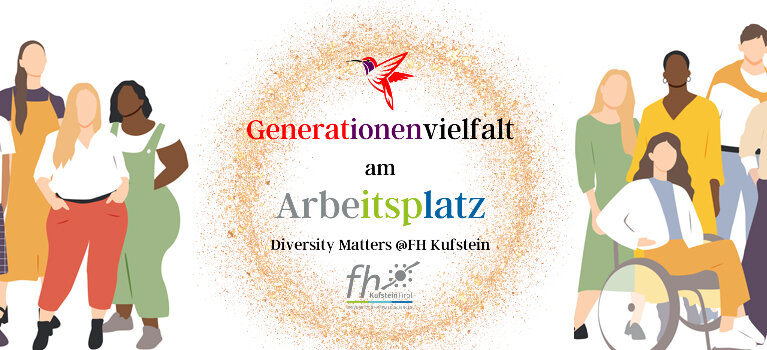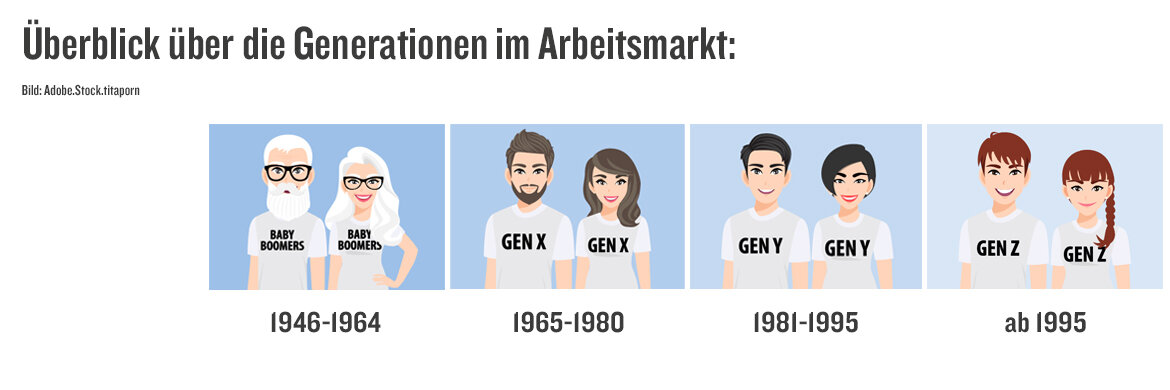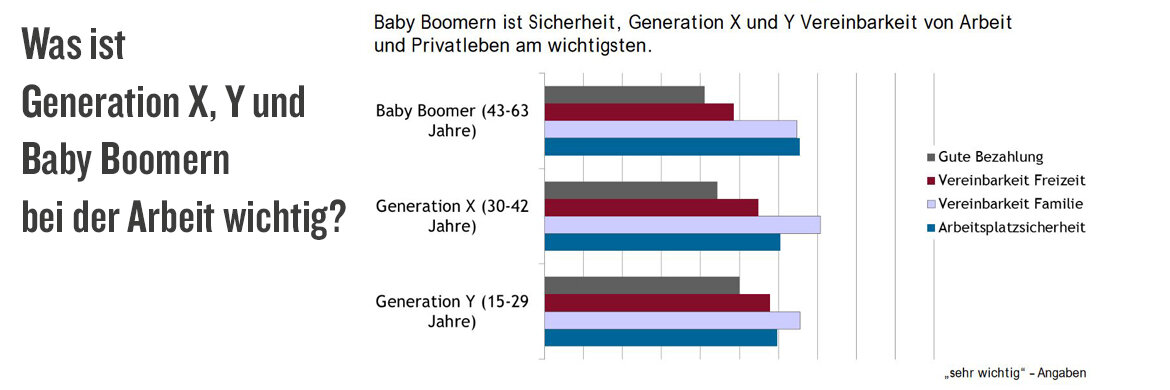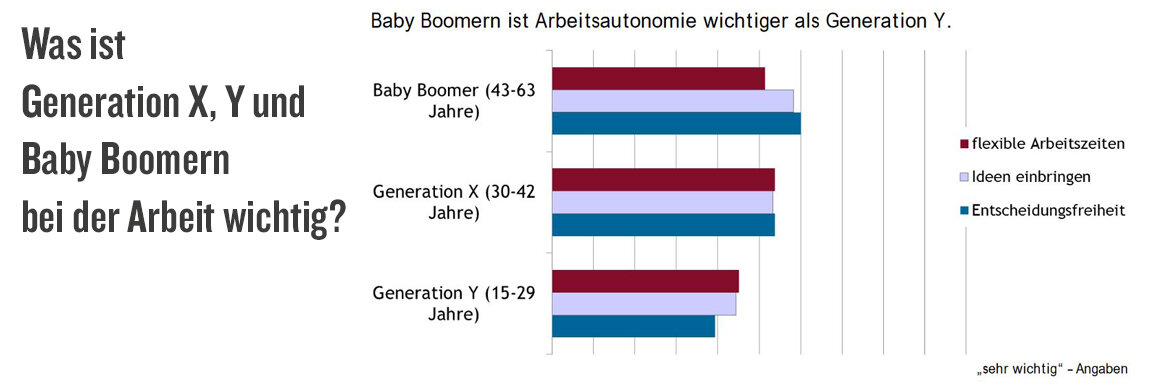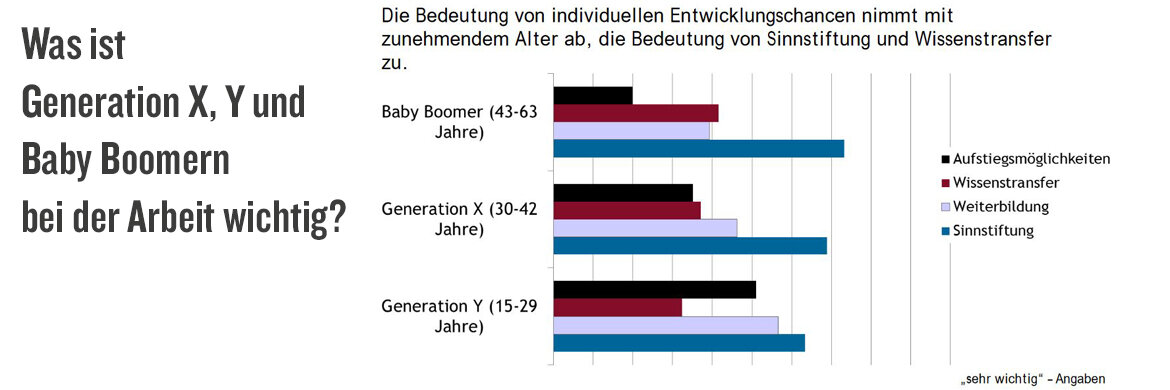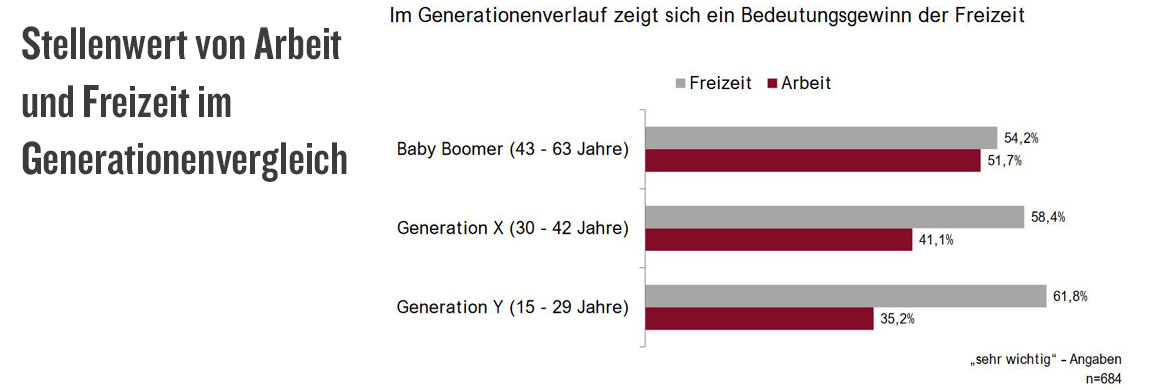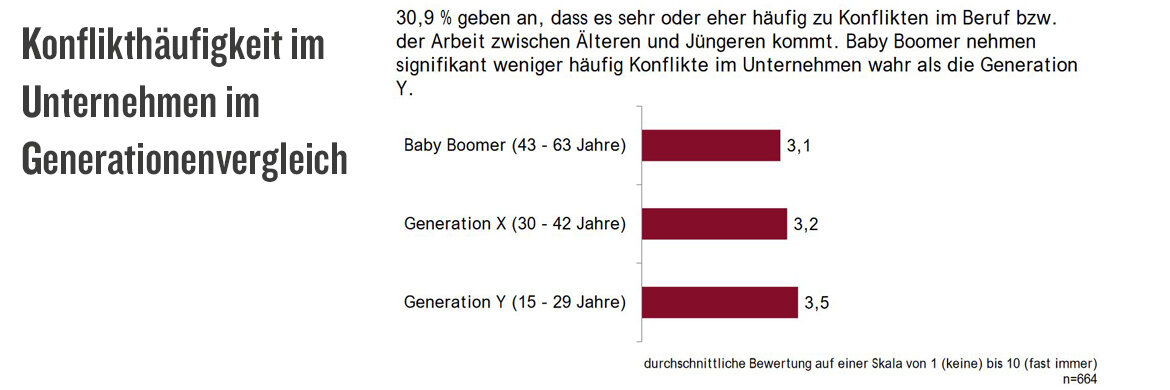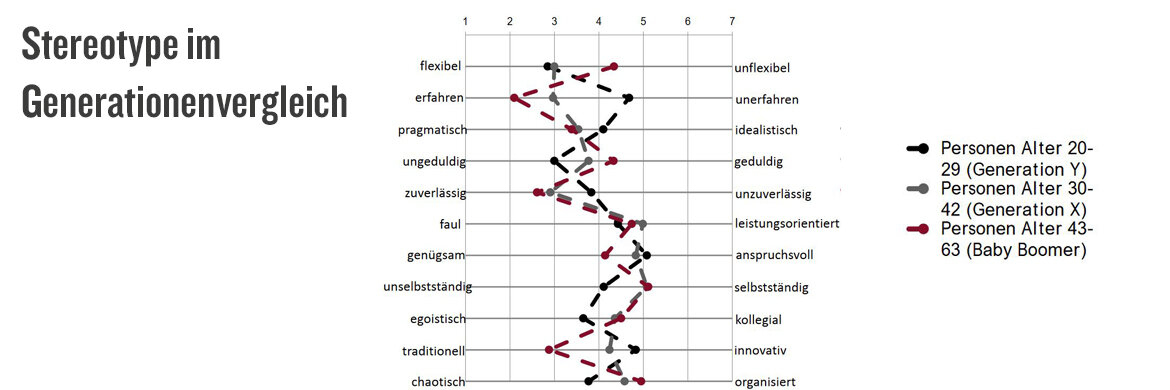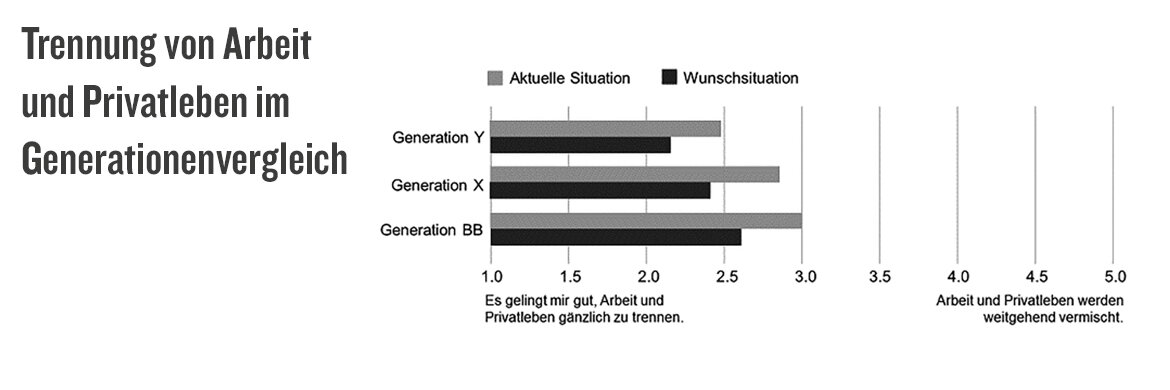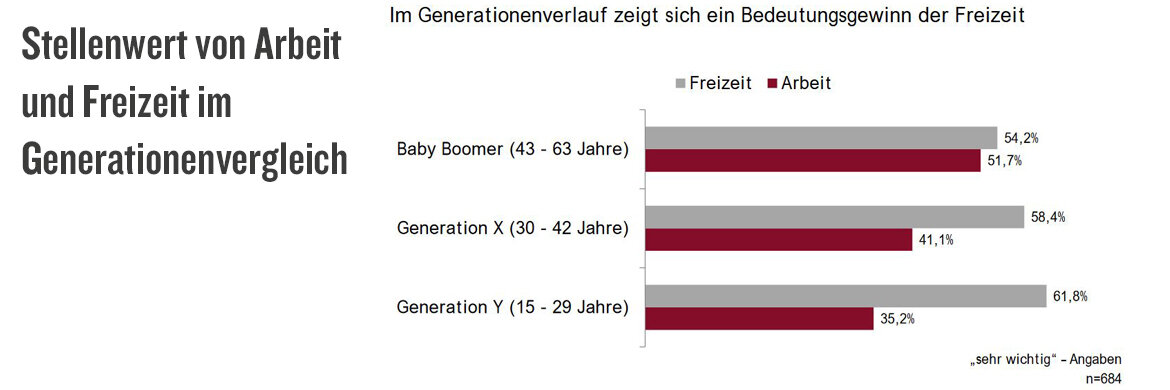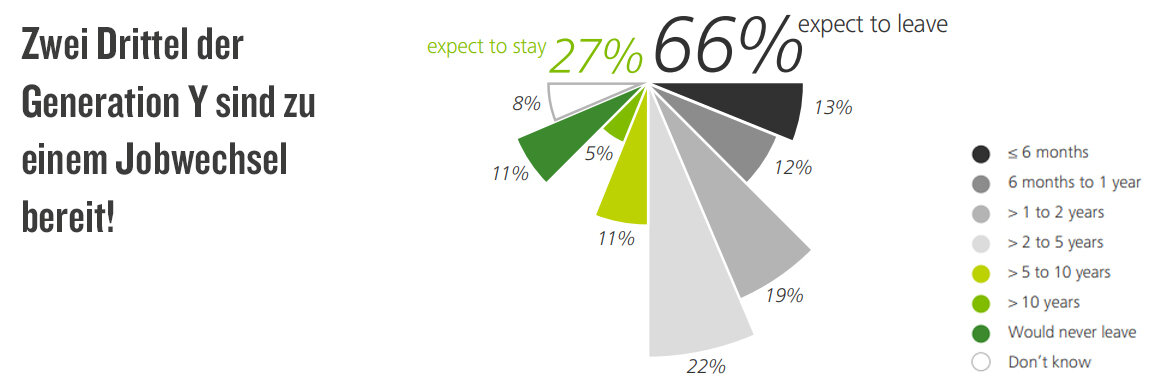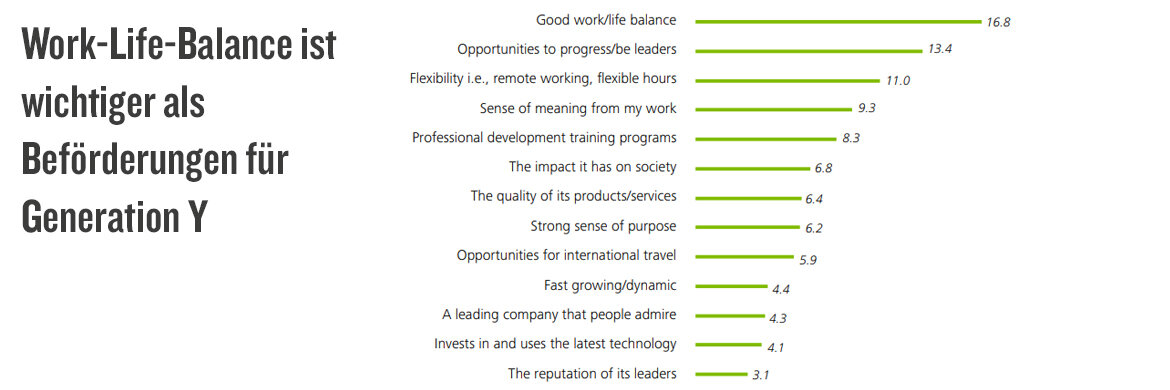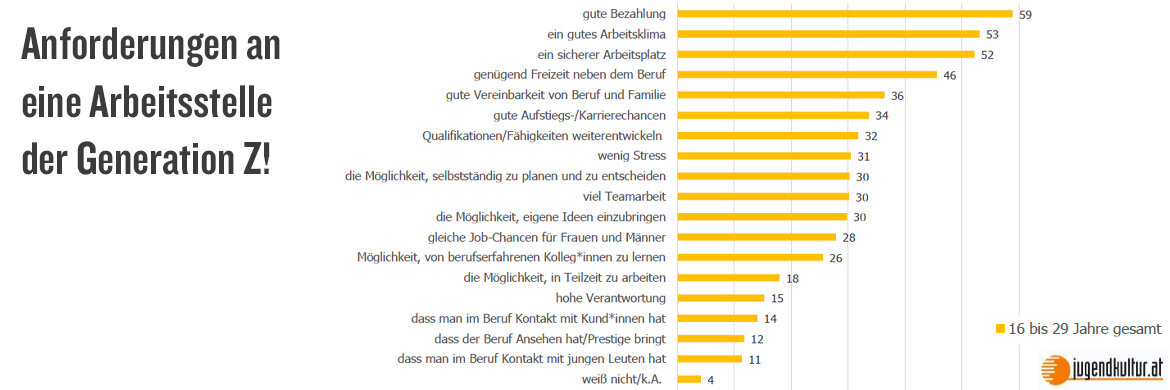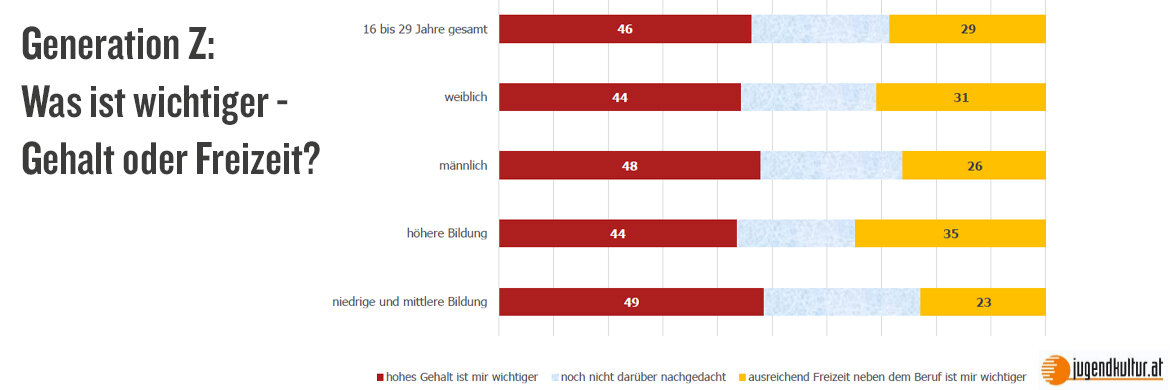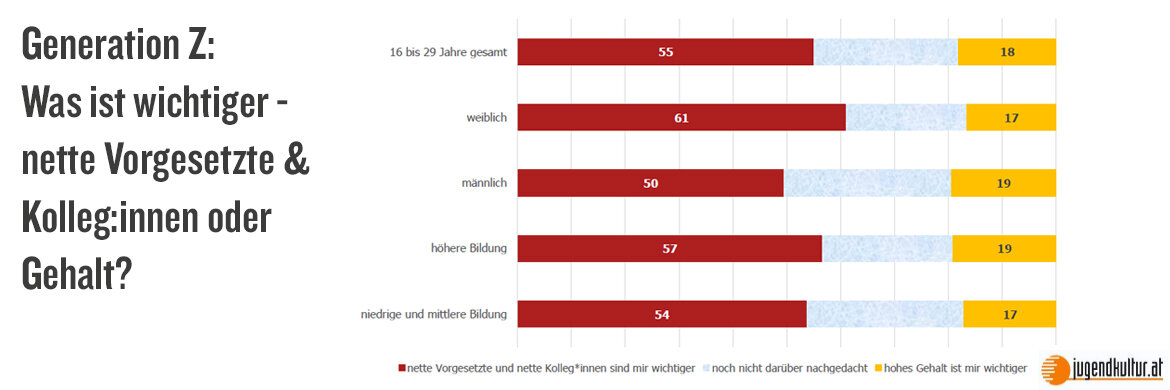Studierende des Studiengangs Unternehmensführung der Kufsteiner Fachhochschule nahmen erfolgreich an einem Blended Intensive Program in Vilnius teil. Im Vordergrund standen transnationale Zusammenarbeit und kultureller Austausch.
Generational diversity in the workplace
This page was researched and published from October 2022 to January 2023.
With the student project Generational Diversity in the Workplace – Diversity Matters@FH Kufstein Tirol within the bachelor degree program Sports, Culture & Event Management, the project group aims to raise awareness for constructive cooperation and the various needs of different generations in the professional world in order to
- detect and avoid conflict issues,
- properly utilize the potential of different generations in the workplace and
- offer employers a point of contact for issues related to this topic
Join us
About us
The new project in the event series Diversity Matters provides a way for FH Kufstein Tirol to address the topic of age as it relates to cooperation among various generations in the labor market. The goal of the students of the degree program Sports, Culture & Event Management is to analyze the current state of research and subsequently prepare a guide as a way to assist companies with this issue. On the one hand, the guide is to elucidate specific needs that are important to different generations with respect to their employment. On the other, it is important for us as students to point out how values and also role patterns have changed in recent decades. The content of the website is based on literature research and podcasts as a substantiation of the current state of research.
The focus of the project is on Generations Y and Z, the latter being the youngest generation active on the labor market and therefore particularly interesting for employers.
Sparkasse Kufstein
We want to thank our sponsor Sparkasse Kufstein for supporting this project. Sparkasse Kufstein has itself shown great commitment in the area of generational diversity in the workplace.
The two podcast episodes in the event category provide exclusive insight into the topic of generational diversity at Sparkasse Kufstein.
Diversity Matters – in the professional world as well!
Quote from Sparkasse Kufstein: “The topic of generational diversity in the workplace ideally fits with our #glaubandich campaign [believe-in-yourself campaign]. The purpose of #glaubandich is to encourage people to hold on to their goals and achieve them. Our country needs people who believe in themselves. And a bank that believes in them.
As a strong regional partner, we are convinced that our region is full of unique stories of diverse people who believe in their dreams. We are convinced that each generation brings wholly individual characteristics and qualities to the table; we also believe that we can achieve more together. Our colleagues Daniela and Hannes share their impressions and experiences gained over the course of their professional lives at Sparkasse Kufstein.”
Important facts about the generations in the labor market
Social change is leading to increasingly differentiated target groups with specific needs and attitudes toward their employment. Detailed knowledge with respect to generational labor market research is not yet available, especially in regard to Generations Y and Z who are just starting out in their careers or will be sending out their first applications in the next years.
Generations are divided based on common conditions impacting the life-cycle. Among other things, common social, political and technological influences among age groups are determinative for the respective generations. These again shape attitudes toward professional life (Institute for Youth Culture Research, 2022). Young employees bring changes and innovative ideas to a company. Work methods and existing business structures, which were shaped by previous generations, are critically reflected and questioned (Schlotter and Hubert, 2020).
Sources:
- Institut für Jugendkulturforschung (2022). Warum Inter-Generationenanalyse? Um die Treffsicherheit Ihrer Zielgruppenstrategien zu erhöhen. acessed December 13, 2022 https://jugendkultur.at/warum-generationenvergleich/
- Schlotter, L & Hubert, P. (2020). Generation Z –Personalmanagement und Führung. 21 Tools für Entscheider. Springer Fachmedien.
Until 2030, the generation of baby boomers will make up almost half of all employees in the labor market. From 2030 onward, this large age group will gradually leave the labor market and, due to succeeding years with low birthrates, will not be adequately replaced.
According to Schlotter and Hubert (2020), the birth rates in the 1960s were nearly double the rates in the 2000s. Additionally, tertiarization is creating more and more opportunities that do not require specific qualifications and specialized knowledge in order to find employment. This deficiency already existed at the time when Generation Y entered the labor market and will be exacerbated with respect to succeeding generations. Within this context Schlotter and Hubert talk about a war for talents. In some occupational groups, this imbalance in the labor market will allow Generation Z to freely pick their employers.
Employers try to accommodate the needs of following generations and retain them in the company for as long as possible. In light of this variety of options, young people approach employers with a more confident and demanding attitude. For Generation Y and Z, job changes are almost routine if they do not feel valued within a company, wage negotiations do not meet their expectations or further development opportunities are not provided. Corporate social responsibility of companies represents an important aspect for these age groups. Thus, sustainable work, meaningful products and ethically appropriate behavior toward staff are increasingly important for employees from Generations Y and Z (Straßer and Lütkehaus, 2020). One of the voices in the podcast agrees: “Generally speaking it is important for me to work in a company that is moving in a direction that is also near and dear to my heart and where I can do my part and contribute to this goal.” (Holzmann A.)
Sources:
- Schlotter, L & Hubert, P. (2020). Generation Z –Personalmanagement und Führung. 21 Tools für Entscheider. Springer Fachmedien.
- Straßer, U. & Lütkehaus, I. (2020). Cross Generational Intelligence. Kooperation der Generationen im Unternehmen. Haufe.
The digital world is especially a part of Generation Z’s reality as smartphones and social media belong to their everyday lives. They use technologies to solve problems and develop strategies. The Internet has always existed in the lifetime of Generation Z, which constitutes a difference to Generation Y who, for the most part, grew up without it. Generation Z uses the Internet in order to solve problems and make life easier while Generation Y primarily uses it for self-expression and entertainment.
Generation Z benefits from the transparency characteristic, the expression of opinions and the evaluation option afforded by the Internet. From their parents, this age group has already learned to critically reflect on digital media; therefore, maintaining a distance toward digital media is also equally important to them (Straßer and Lütkehaus, 2020). According to Scholz (2014), Generation Y and Z are also described as “digital natives” since they are highly familiar with digital technologies. As recounted by a voice in the podcast, employers are also discovering this potential: “I have a young colleague who has meanwhile become an expert in digital media.” (Bucher D.)
For companies, this knowledge offers tremendous potential in order to maintain their established position on the market. Moreover, digital natives are usually also up to date in regard to their field of specialization due to the strong integration of Internet and digital media. Networking with customers through online and social-media platforms is also very important to them. This development also plays an essential role for museums as was made clear in the podcast discussion: “Digitization is already an enormous topic […]. We have reached a kind of watershed moment. In the museum, we naturally work with originals, with objects or historical materials, but I also spend a lot of my time simply making content available digitally, […] entering information into databases.” (Holzmann A.)
Sources:
- Scholz, C. (2014). Generation Z – Wie sie tickt, was sie verändert und warum sie uns alle ansteckt. Wiley.
- Straßer, U. & Lütkehaus, I. (2020). Cross Generational Intelligence. Kooperation der Generationen im Unternehmen. Haufe.
Flexibility in the workplace is shaped by two essential factors: work relationships and work environment.
Especially Generation Y took part in many internships during their entry into the labor market, which already points to short-term commitment. Flexibility in the work environment encompasses virtual cooperation in permanent or freelance employment relationships. In addition to a permanent position within a company, young people will often also make money through self-employment activities. For many in Generation Z, it is normal to just stay with a company for a short period of time as they do not see themselves remaining in one job over the course of their entire professional lives but choose to change jobs frequently. However, they are also aware of the downside of this flexibility as such a flexible attitude is accompanied by unstable and insecure work conditions (Straßer and Lütkehaus, 2020).
Work-life balance is another equally important aspect, which, according to Schlotter and Hubert (2020), has developed into a work-life separation for Generation Z. For young employees, the separation between work and leisure is a crucial topic. Flexible work hours and employment conditions are to be noted within this context (Schlotter and Hubert, 2020). Boßow-Thies, Zimmer and Kurzenhäuser-Carstens (2019) expand these developments by adding flexible work locations. This work format is defined as “mobile-flexible work” and encompasses temporal, spatial and structural workplace changes. Digitization is especially advancing this development (Boßow-Thies, Zimmer and Kurzenhäuser-Carstens, 2019).
Sources:
- Boßow-Thies, S. & Zimmer, M.; Kurzenhäuser-Carstens, S. (2019). Mobil-flexibles Arbeiten und Stress –eine quantitative Analyse mit PLS. In: Hermeier (Hg.), Arbeitswelten der Zukunft (S. 345–360). Springer Fachmedien.
- Schlotter, L & Hubert, P. (2020). Generation Z –Personalmanagement und Führung. 21 Tools für Entscheider. Springer Fachmedien.
- Straßer, U. & Lütkehaus, I. (2020). Cross Generational Intelligence. Kooperation der Generationen im Unternehmen. Haufe.
Baby Boomer
The baby-boomer generation includes everyone born between 1946 and 1964. Baby boomers are the first generation that grew up after the Second World War (Straßer & Lütkehaus, 2020). They were predominantly raised by a generation of so-called traditionalists. Their parental home was governed by clear role allocations as well as hierarchical relationships according to the “traditional family” model (Mangelsdorf, 2015).
The baby-boomer generation as the post-war generation was shaped by optimism, stability and prosperity. They experienced the “economic miracle” that took shape after the war. For many of them, this means work is the number one priority. Significant developments also took hold in educational policy, which resulted in an upsurge in schools, universities and the labor market (Mangelsdorf, 2015).
The generation of baby boomers was shaped by positive and innovative developments (such as the moon landing, color television and especially the emergence of pop music), which provided new opportunities. However, at the same time, new boundaries and problems also emerged such as the Berlin Wall, the so-called Cold War as well as the oil crisis and the Cuban Missile Crisis (Mangelsdorf, 2015; Straßer & Lütkehaus, 2020). Mangelsdorf (2015) states that baby boomers witnessed dramatic changes on all levels, both at the level of educational policy as well as at the economic and social level.
The baby-boomer generation had very high birthrates and therefore constitutes the largest generation in terms of numbers (Straßer & Lütkehaus, 2020).
Sources:
- Mangelsdorf, M. (2015). Von Babyboomer bis Generation Z: Der richtige Umgang mit unterschiedlichen Generationen im Unternehmen. Beltz.
- Straßer, U. C. & Lütkehaus, I. (2020). Cross Generational Intelligence: Kooperation der Generationen im Unternehmen. Haufe.
Baby boomers are the largest generation in terms of sheer numbers. Therefore, they learned hard work and discipline early on and developed assertiveness (Mangelsdorf, 2015). Climbing the corporate ladder within a company became increasingly important (Mangelsdorf, 2015).
A study by the Institute of Change Management and the Global Diversity Office identified important expectations placed on baby boomers. These include “open communication and an understanding between generations, flexibility in personal matters, the transfer of knowledge and a secure retirement as well as further training and participation in career opportunities” (Klaffke, 2022, p. 31). Klaffke (2022) added the supplement that the baby-boomer generation desires more respect and appreciation and that quality of life is of primary importance to them compared to other generations. Many baby boomers regard feedback differently than other generations: they see it as something that must be actively demanded, as a debt that needs to be collected. According to Klaffke (2022), some baby boomers are convinced that treatment on an equal footing is something that must be earned over many years or something that depends on the experience of their counterpart (Klaffke, 2022).
Klaffke (2022) also states that other age groups attribute characteristics such as assertiveness, team spirit and idealism to baby boomers. The baby-boomer generation is perceived as friendly, socially competent and helpful. Moreover, they are described as reliable companions with a pronounced ability for self-assessment (Klaffke, 2022).
Sources:
- Klaffke, M. (2022). Generationen-Management: Konzepte, Instrumente, Good-Practice-Ansatze (3., akt. Aufl. 2022). Springer Gabler.
- Mangelsdorf, M. (2015). Von Babyboomer bis Generation Z: Der richtige Umgang mit unterschiedlichen Generationen im Unternehmen. Beltz.
For the baby-boomer generation workplace security is the top priority. Compatibility between work and family or leisure and a good salary are least important compared to Generations X and Y.
Source: WK Österreich
For baby boomers, professional autonomy is more important than for Generation Y. The freedom to choose and the ability to contribute their own ideas are also especially important to them.
Source: WK Österreich
Baby boomers attach great importance to meaningful work that requires a transfer of knowledge. Opportunities for advancement are comparatively less important to them than for Generations X and Y.
Source: WK Österreich
A significant distinction becomes apparent when comparing the importance of work and leisure among the different generations. Baby boomers attach a much higher importance to work and ascribe a comparatively subordinate role to leisure.
Source: WK Österreich
Baby boomers are least likely to perceive conflicts within a company.
Source: WK Österreich
In the following, baby boomers are compared to the succeeding Generations X and Y based on stereotypes. Baby boomers are
- less flexible than Gen. X and Y
- more experienced than Gen. X and Y,
- more patient than Gen. X and Y,
- more reliable than Gen. X and Y,
- more performance-oriented than Gen. Y, but not as performance-oriented as Gen. X,
- the most frugal generation,
- much more independent than Gen. Y and a little more independent than Gen. X,
- the most collegial generation,
- shaped by tradition and
- particularly well-organized
Source: WK Österreich
Generation X
Every generation goes through various phases and experiences significant events that shape the formation of habits. Various values are derived from all these experiences. The so-called Generation X includes the birth cohort between 1965 and 1980.
It is an age group shaped by numerous natural and humanitarian catastrophes such as terror attacks, environmental catastrophes, the economic crisis and general unrest. In their adult years, the fall of the Berlin Wall and the associated reunification of West and East Germany were particularly impactful. Moreover, members of this generation experienced the beginnings of the media revolution and basically grew up with technical advances as well as with digitization. This age group generally received good support in the parental home as improved educational opportunities established themselves. Therefore, the majority of people born in these years have advanced training and education. This generation experienced innovative changes, which include digitization, the fall of the Berlin Wall and the rising importance of equality and diversity, globalization as well as ecological developments (Oertel, 2021).
Source:
- Oertel, J. (2021). Baby Boomer und Generation X – Charakteristika der etablierten Beschäftigten-Generationen. In M. Klaffke (Ed.), Generationen-Management: Konzepte, Instrumente, Good-Practice-Ansätze (pp. 66–75). Springer Fachmedien. https://doi.org/10.1007/978-3-658-34787-1
In the following section, Generation X is to be analyzed based on expectations placed on the professional world. Oertel (2021) characteristically describes members of Gen. X as individualistic and independent with a constant drive for improvement. This generation places greater value on holding a good position in an ideal workplace, compensation and development opportunities. Kugler (2020) describes this generation as the reunited generation striving for freedom and peace. According to the Generational Research Institute, members of this group occupy 80% of management positions. This can be attributed to the support they received in the family home and the associated opportunity for better education. They also expect to have the freedom to shape their workplace as independence plays an important role in dealing with this target group. For this group, leisure is just as important as freedom. The age cohort between 1965 and 1980 greatly values the work-life balance. Moreover, family plays a central role for women and men, which can also be seen in the importance of separating leisure from work (Kugler, 2020). A respondent in the podcast affirms this: “[...] I go home at a certain time. I’ve got my family at home. I want to see my children grow up. That’s very important to me.” (Widmann H.)
In professional life, 40 to 55-year-olds are currently among the older employees as Generation Y and Z are following behind. This often leads to conflicts as these older employees do not like to be placed in subordinate roles and younger employees may try to take their positions (Oertel, 2021). As explained in the previous section, baby boomers are gradually leaving the professional world, leaving positions unfilled. Here the competition between Generation X and Y comes into play. Oertel (2021) also mentions that members of Gen. X do not like to be helped by younger people, for example, when it comes to technical aspects. This exacerbates cooperation problems in the workplace as clear points of conflict emerge. Generation X wants to defend its position in the workplace and feels somewhat threatened by succeeding generations. The challenge for the employer consists in recognizing the needs of employees and especially communicating clearly with members of Gen. X and acknowledging their work.
“Winning over, motivating and retaining the highly productive “Gen Xers” requires support for them in their current living situations with their varied and, concurrently, high demands and also offering them viable development perspectives.” Oertel (2021)
Sources:
- Institut für Generationenforschung. (o.D.). https://www.generation-thinking.de/generation-x
- Kugler, P. (2020). Gut zu wissen: Arbeitsflexibilisierung für die Baby Boomer und die Generationen X und Y: Was Mitarbeiter wollen und Unternehmen bieten. In S. Wörwag & A. Cloots (Eds.), Zukunft der Arbeit – Perspektive Mensch: Aktuelle Forschungserkenntnisse und Good Practices (S. 163–173). Springer Fachmedien. https://doi.org/10.1007/978-3-658-26796-4_10
- Oertel, J. (2021). Baby Boomer und Generation X – Charakteristika der etablierten Beschäftigten-Generationen. In M. Klaffke (Ed.), Generationen-Management: Konzepte, Instrumente, Good-Practice-Ansätze (S. 66–75). Springer Fachmedien. https://doi.org/10.1007/978-3-658-34787-1
The following section provides statistics that again elucidate the values of Generation X.
As previously mentioned, work-life balance is an important topic for this age group. The actual and desired situation in separating professional from private life was elucidated and compared in a Swiss study by Bossard et al. (2017), which revealed that employees desire a greater separation in these areas.
Source:
- Bossard, Y., Büchel, A., Bürchler, M., Shabanaj, S., & Shabanaj, Z. (2017). Die neue Arbeitswelt: Innovatives Management, Büros und die Generationen Babyboomer, X und Y. Wissenschaftliches Praxisprojekt, Schlussbericht. FHS St.Gallen.
A closer look at the study by Kolland and Wanka (2016) clearly shows the importance of work-life compatibility in order to have enough time with the family.
The podcast included an employer’s reaction to this: “There is, for example, […] a project where people sing together in a choir and the team meets […] just to sing. I think this is a wonderful idea […] that there is such a smooth transition. It is, of course, not done during work hours but organized by the company in a specific location, but many seem to enjoy doing this in their leisure time.” (Holzmann A.)
Source:
Kolland, F. & Wanka, Anna. (2016) Von den Baby Boomern zur Generation Y. Wirtschaftskammer Wien.
Generation Y
Klaffke (2014) describes Generation Y (also known as millennials) as a questioning cohort. Within this context, the author is referring to the age group born between 1981 and 1995. However, Spickenreither and Sackmann (2019) argue that there is no overarching classification for this age group, and, therefore, generalizations are not possible.
A study by Deloitte (2016) reveals that about half of all available employees on the labor market are members of Generation Y. According to Bieber (2013), Generation Y possesses a high degree of qualification because, among other things, they always remain up to date with respect to a dynamically changing world and technological innovations. Especially due to the stated reasons, Spickenreither and Sackmann believe that companies must exert a concerted effort when it comes to this cohort. Nonetheless, realistic expectations must be fomented since employees from Generation Y are well-aware of their own competence (Spickenreither & Sackmann, 2019).
With respect to this generation, Bieber (2013) speaks of exaggerated notions in regard to entry-level salary and occupational activities. Moreover, Spickenreither and Sackmann (2019) claim that millennials are not loyal to their employers. The two authors base this claim on the results of a study by the London Business School (2014), which states that representatives of Generation Y may have 15 to 16 different employers over the course of their professional careers. This indicates a strong willingness for change. However, this characteristic is often attributable to low demands placed on these employees or minimal support from management.
Spickenreither and Sackmann (2019) describe this cohort as performance-oriented, ambitious and constantly on the lookout for personal development. The authors also point out that needs such as security, belonging and tolerance play a significant role for millennials. Moreover, Generation Y has a pronounced environmental awareness as well as a desire for participation, co-creation and networking. According to Klaffke (2014), the latter is attributable to the development of the Internet and social media. The author also shares the opinion that the Internet has given members of this cohort an increasing market transparency and, as a consequence, increased market power since they have the option to perform cost-benefit comparisons. According to Klaffke, this development makes people more reflective but also more demanding and allows them to distinguish themselves through individual purchasing behavior. These are characteristics that are also typical for Generation Y. Members of Generation Y also demonstrate an increased interest in diversity in the form of cultural diversity as well as pluralistic lifestyles (Klaffke, 2014).
Source:
- Bieber, P. (2013). Digital Natives rekrutieren. In W. Appel & B. Michel-Dittgen (Eds.), Digital Natives: Was Personaler über die Generation Y wissen sollten (S. 225–237). Springer Fachmedien. https://doi.org/10.1007/978-3-658-00543-6_15
- Klaffke, M. (2014). Millennials und Generation Z – Charakteristika der nachrückenden Arbeitnehmer-Generationen. In M. Klaffke (Hrsg..), Generationen-Management: Konzepte, Instrumente, Good-Practice-Ansätze (S. 57–82). Springer Fachmedien. https://doi.org/10.1007/978-3-658-02325-6_3
- London Business School (Direktor). (2014, August 4). How is Generation Y changing the way we work? | London Business School. https://www.youtube.com/watch?v=PZYWVp4Ar0Y
- Spickenreither, N., & Sackmann, S. (2019). Herausforderung Millennials – ihre Charakteristika und Erwartungen mit Implikationen für wirksame Führung und Zusammenarbeit. In S. Sackmann (Hrsg.), Führung und ihre Herausforderungen: Neue Führungskontexte erfolgreich meistern und zukunftsfähig agieren (S. 65–82). Springer Fachmedien. https://doi.org/10.1007/978-3-658-25278-6_4
According to Klaffke, there are six overriding topics that are of significant importance to Generation Y in the workplace. These include reliability, performance, pleasure, meaning, development, authenticity and affiliation (Klaffke, 2014, p. 91 et seqq).
Reliability:
According to Klaffke, members of this generation long for stability, predictability and reliability, which is why they regard a secure workplace as very important. An attractive base salary as well as potentially higher income over the course of their professional careers follows in second place, whereas, for women, these expectations are less pronounced than, for example, the promotion of work-life balance (Klaffke, 2014, p. 92).
Performance:
From their employers, millennials expect varied feedback, appreciation and recognition of their performed services. For them, these employer attributes are among the most attractive and important in regard to the workplace (Klaffke, 2014). This seems to also play an important role in the management style of persons from this generation, which can be substantiated with the following quote: “I believe that feedback is very important... it can hurt sometimes, but it’s true that one learns from it... people need both positive and negative feedback in order to progress.” (Schwienbacher, P.)
Pleasure:
According to Klaffke (2014), millennials attach great importance to the topic of work-life balance. A study by DGB (2019, cited in Klaffke, 2014), reveals gender-specific differences in this regard. According to this study, women feel time pressure more intensely at work than men, which can be attributed to the supervision of children or other people in need of care. Flexible working models in regard to time and location are therefore especially attractive to Generation Y in order to achieve compatibility between work and professional life (Klaffke, 2014). This thesis is confirmed by Kugler (2020) as she reaches the conclusion in her study that flexible working hours represent the most interesting workplace development.
Meaning:
Members of Generation Y want to contribute their own ideas at the workplace, which concurrently represents one of their most important expectations for potential employers (Klaffke, 2014). The author relies on insights from the study published by Universum (2019, cited in Klaffke 2014), which shows that the desire to change employers is higher with millennials who have little confidence in their abilities and receive little recognition for their performance from management. Some management levels seem to have already taken this insight into account as substantiated by the following quote: “It is important for employees to be given a voice, express their opinion and shape the workplace. Thus, the burden of decisions is shared and alleviated.” (Schwienbacher, P.)
Development:
Klaffke claims that development and self-actualization possibilities represent the most significant attractive characteristic in regard to employers. Moreover, developmental support from executives, professional training and additional continuing education opportunities are especially important for millennials (Klaffke, 2014). Kugler shares a similar view. The author adds that executives should take on the role of a coach and that this should also be reflected in the leadership style in line with the motto “coaching, not controlling” (Kugler, 2020, p. 169).
Authenticity and affiliation:
For members of Generation Y, authenticity and credibility in regard to the employer’s brand play an important role. Moreover, it is of great importance for executives to address millennials on an emotional level in order to, on the one hand, address the individual needs of employees and, on the other, to make it possible to cultivate management relationships built on partnership (Klaffke, 2014). These insights can be substantiated with the following quote from on of our podcast episodes: “I believe that a company is only as good as its employees... and that the interpersonal level is not to be underestimated.” (Schwienbacher P.)
Source:
- Klaffke, M. (2014). Millennials und Generation Z – Charakteristika der nachrückenden Arbeitnehmer-Generationen. In M. Klaffke (Ed.), Generationen-Management: Konzepte, Instrumente, Good-Practice-Ansätze (pp. 57–82). Springer Fachmedien. https://doi.org/10.1007/978-3-658-02325-6_3
- Kugler, P. (2020). Gut zu wissen: Arbeitsflexibilisierung für die Baby Boomer und die Generationen X und Y: Was Mitarbeiter wollen und Unternehmen bieten. In S. Wörwag & A. Cloots (Eds.), Zukunft der Arbeit – Perspektive Mensch: Aktuelle Forschungserkenntnisse und Good Practices (pp. 163–173). Springer Fachmedien. https://doi.org/10.1007/978-3-658-26796-4_10
The representative study by Deloitte (2016) with about 7,700 millennials from 29 countries revealed that about 66% of respondents intended to change employers within the next 6 months and only 10% could imagine remaining with the same employer for the long-term.
This indicates little loyalty as well as a strong willingness for change within Generation Y. The reason for this is also a weak promotion of management styles, which is mentioned by about 71% of questioned millennials as the main reason for change. Moreover, the study shows that members of this generation expect their employers to put their employees above purely financial goals in order to achieve long-term success and retain employees (Deloitte, 2016).
The study also showed that loyalty to employers acutely increases when a mentor is provided since members of this generation then feel supported in their professional development (Deloitte, 2016).
Sources:
- Gx-millenial-survey-2016-exec-summary.pdf. (n.d.). acessed December 5, 2022, von https://www2.deloitte.com/content/dam/Deloitte/global/Documents/About-Deloitte/gx-millenial-survey-2016-exec-summary.pdf
Zusätzlich kommt die Studie von Deloitte zum Ergebnis, dass “Work-Life-Balance" sowie mögliche Aussichten auf eine Führungsposition zu den wichtigsten Merkmalen bei der Auswahl eines Jobs gehören. Diese Faktoren wurden von rund 30% der Befragten angeführt und erhöhen wiederum die Wahrscheinlichkeit des Verbleibs eines Mitarbeitenden (Deloitte, 2016).
Auch in Puncto Arbeitsplatzgestaltung heben sich “Millenials” deutlich von älteren Generationen ab. Kugler zeigt auf, dass rund 47% der Studienteilnehmer:innen der Generation Y sich Teambüros wünschen, wobei dies eher bei jüngeren Vertreter:innen dieser Generation der Fall ist und auf die noch unzureichende Arbeitserfahrung zurückgeführt werden kann. Diese unzureichende Arbeitserfahrung führt häufig zu Rücksprache sowie Austausch unter Kolleg:innen, was wiederum zu einer Belastung der bereits erfahreneren Arbeitskolleg:innen führt (Kugler, 2020).
Quellen:
- Gx-millenial-survey-2016-exec-summary.pdf. (n.d.). Abgerufen am 5 Dezember 2022, von https://www2.deloitte.com/content/dam/Deloitte/global/Documents/About-Deloitte/gx-millenial-survey-2016-exec-summary.pdf
- Kugler, P. (2020). Gut zu wissen: Arbeitsflexibilisierung für die Baby Boomer und die Generationen X und Y: Was Mitarbeiter wollen und Unternehmen bieten. In S. Wörwag & A. Cloots (Eds.), Zukunft der Arbeit – Perspektive Mensch: Aktuelle Forschungserkenntnisse und Good Practices (S. 163–173). Springer Fachmedien. https://doi.org/10.1007/978-3-658-26796-4_10
Generation Z
Generation Z is the youngest generation on the labor market. According to economic scientist Christian Scholz (2019), this age group, born from 1995 onward is regarded as a game changer.
Members of this generation grew up in a highly digitized world and are able to keep pace with rapid developments in this field. Thus, this group especially has a good intuition in regard to new trends and technologies, which include various digital communication channels via which Generation Z demands a transparent and direct exchange, e.g. in regard to data security. A characteristic feature of this age group is the fact that they are currently in their twenties, a defining stage of their life and a time in which they develop their values based on experiences and events that shape them (Straßer and Lütkehaus, 2020). One of the characteristics of Generation Z is that they regard individual development as important; they enjoy life and like trying out new task fields (Andrione, 2018).
Generation Z is able to adapt to current working conditions and develop these further. For companies, this means that they are always up to date in regard to their work methods. This age group knows how to live together with people from different generations and advocates for working conditions that are acceptable to all generations (Straßer and Lütkehaus, 2020). Scholz (2014) adds that the behavioral patterns and values of Generation Z can be transferred to previous generations on account of the positive charisma of this generation.
Source:
- Andrione, L. (2018). Eigenschaften, Einstellungen und Werte von Generationen: Stand und Aussicht der Forschung. In: Gr Interakt Org 49 (4), S. 415–419. DOI: 10.1007/s11612-018-0435-5
- Scholz, C. (2019, 22. April). Generation Z. Hyperflexibilisierung ist bei Jungen out. Der Standard. accessed December 21, 2022, von https://www.derstandard.at/story/2000101607941/hyperflexibilisierung-ist-bei-jungen-out
- Scholz, C. (2014). Generation Z – Wie sie tickt, was sie verändert und warum sie uns alle ansteckt. Wiley.
- Straßer, U. & Lütkehaus, I. (2020). Cross Generational Intelligence. Kooperation der Generationen im Unternehmen. Haufe.
At the Generational Research Institute founded by Rüdiger Maas, researchers explored the question what Generation Z expects from employers. The institute developed six key character attributes for Generation Z (Maas 2019).
Confident:
Generation Z has a positive attitude toward their professional future. Due to advancing demographic change, this generation expects that it will be easy to attain a management position (Maas, 2019). In a value study among students of the Institute for Youth Culture Research (2022), this confident attitude manifested itself in the stated desire of a majority of respondents to achieve and attain something in life.
Family orientated:
This generation regards the many directions that young people can pursue in training and occupation as overwhelming. Therefore, parents play an important role by providing consultation and support in the decision-making process (Maas, 2019). Scholz (2014) refers to the importance of parents, which already emerged in the upbringing of Generation Z. Baby boomers are sometimes also referred to as helicopter parents as they show a strong interest in the lives of their children, not just during their school time but also in their professional lives. The study of the Institute for Youth Culture Research (2022) shows that, among participating students, 76% see family as important and only 31.2% see the profession as important (Institute for Youth Culture Research, 2022).
Individualistic online:
Individuality is a central characteristic of Generation Z for marketing themselves online. This generation knows that uniqueness is perceived and appreciated much more readily in social networks than common characteristics shared with many others (Maas, 2019).
Conservative offline:
Contrarily, Generation Z values a “normal” life. Gen. Z regards established structures that provide orientation as all the more important in these times of fast-moving social and technological change. They often orient themselves along the value positions of their parents (Maas, 2019). The study by the Institute for Youth Culture Research (2022) also shows the high importance of stability in economics, politics, culture and society. “Over the last 10 years, there has been a renaissance of traditional values such as order, frugality, cleanliness, family and communality.” (Institute for Youth Culture Research, 2022)
Impatience:
According to the current trend of same-day delivery, live tickers, streaming, etc., Generation Z also wants instant gratification, for example when shopping or implementing a project idea. Compared to prior generations, it is normal for them to acquire something immediately without long wait times (Maas, 2019).
Digital proficient:
Generation Z has grown up with digital technologies and has never experienced a world without these. This has an impact on how they handle these tools as they tend to be proficient and quick in operating devices (Maas, 2019). Especially while working with social media, on the Internet, with smartphones and apps, this generation shows their proficiency (Straßer and Lütkehaus, 2020).
Sources:
- Institut für Jugendkulturforschung. (2022). Österreichische Wertestudie unter Studierenden. High Potentials für den Arbeitsmarkt? Die Bildungseliten unter Druck. accessed December 21, 2022 von https://jugendkultur.at/neue-studie-high-potentials-fuer-den-arbeitsmarkt/
- Maas, R. (2019). Generation Z für Personaler, Führungskräfte und jeden der die Jungen verstehen muss. Ergebnisse der Generation-Thinking-Studie. Hanser.
- Scholz, C. (2014). Generation Z – Wie sie tickt, was sie verändert und warum sie uns alle ansteckt. Wiley.
- Straßer, U. & Lütkehaus, I. (2020). Cross Generational Intelligence. Kooperation der Generationen im Unternehmen. Haufe.
Generation Z distinguishes itself from Generation Y by the fact that it is just now coming into contact with the working and professional world. For this reason, value patterns and expectations cannot yet be conclusively determined. There are similarities among both generations in regard to their upbringing. As common aspects, Straßer and Lütkehaus (2020) identify caring parents, fragile family structures, a good educational level as well as economic and political stability.
However, it must be mentioned that not all members of this generation grew up in prosperity; about a third was raised in poverty. Moreover, on account of the financial situation of their parents, they did not have the option to complete training in private schools and universities. Individualization is a trend that can be seen in this generation. The growing lack of skilled employees as well as increasingly shorter market cycles and rapid market changes lead to challenges for employers, an aspect that impacts their work attitudes and expectations toward employees (Straßer and Lütkehaus, 2020).
“Individualization and diversity are essential characteristics of both generations. Diversity is mainstream; change is normal; life is more cyclical than linear.” (Straßer and Lütkehaus, 2020). Their world view is composed of various cultures, religions, sexual diversity and gender equality. Both generations have grown up with digitization, which includes global networking through acquaintances encountered on social networks. However, contacts and friendships are not only forged digitally but also through work & travel or semesters or years abroad during schooling or while studying. (Straßer and Lütkehaus, 2020).
Source:
- Straßer, U.& Lütkehaus, I. (2020). Cross Generational Intelligence. Kooperation der Generationen im Unternehmen. Haufe.
Frequently referenced basic attitudes of Generation Z are realism and satisfaction, orientation and security as well as performance and deceleration (Straßer and Lütkehaus, 2020).
Compared to Generation Y, Generation Z is more determined to stay with a company. However, members of Gen. Z must feel comfortable in all areas before they decide to remain with a company long-term. Personal care and intensive support are important to them. They long for clearly defined tasks and their own offices in which they are free to individually design their workplaces. For Generation Z, personal support means having mentors rather than bosses who take time for their employees. Direct personal contact in order to address the concerns of employees is very important for their well-being within the company (Straßer and Lütkehaus, 2020).
Personal development is one of the characteristic values of Generation Z, which is why it is also important in the professional world. Constant further development is not only based on training but also on growing and learning from failures and improvement based on continuous feedback (Straßer and Lütkehaus, 2020).
Members of Generation Z desire varied work tasks in order to self-actualize themselves. Ideally, a position will provide reliable work conditions and regulated salaries. Members of Generation Z reject taking on the role of the responsible party as well as administrative tasks such as providing information over the phone, appointment coordination or correspondence in writing (Brademann and Piorr, 2019).
Compared to the previous generation, a clear separation between work and private life is important to them (Straßer and Lütkehaus, 2020). In their examination of binding members of Generation Z to a specific company, Brademann and Piorr (2019) also reached the same conclusion of a clear separation between these areas. They regard availability outside of work hours as dangerous and demand from their employers that they ensure a separation between leisure and work. Moreover, they differentiate between private friends and work colleagues (Straßer and Lütkehaus, 2020).
Source:
- Brademann, I.& Piorr, R. (2019). Generation Z – Analyse der Bedürfnisse einer Generation auf dem Sprung ins Erwerbsleben. In: Hermeier (Hg.), Arbeitswelten der Zukunft (S. 345–360). Springer Fachmedien.
- Straßer, U.& Lütkehaus, I. (2020). Cross Generational Intelligence. Kooperation der Generationen im Unternehmen. Haufe.
The Institute for Youth Culture Research performed a study in April 2022 on the topic of Generation Corona and the Professional World of Tomorrow. 1,000 participants between the ages of 16 and 29 were surveyed. It must be taken into account that the study was strongly influenced by the pandemic, which impacted the attitudes of this age group in regard to the topic of occupation.
It was striking that an interesting occupation was perceived as much more important than open-ended employment. The option of working from home was perceived as important by approx. ¼ of respondents and as not important by another ¼. “It would be nice if things would change again so it’s possible to work more from the office again,” (Asang S.) as a voice from the podcast expressed it. Moreover, according to the survey by the Institute for Youth Culture Research (2022), a fixed stipulated work time may be more important than free time management. This age group primarily demands management to be empathetic in regard to employees’ concerns and problems and to be communicative (Institute for Youth Culture Research 2022).
Source:
- Institut für Jugendkulturforschung (2022): Studie Generation Corona & die Arbeitswelt von morgen. Wien.
The majority of respondents regard a good salary as important followed by a good work climate and a secure workplace. Sufficient leisure time is seen as of equally high importance. The relevance of a good work climate is also underlined in the podcast: “In my opinion, a good work climate always has something to do with trust, i.e., trusting each other is what is most important to me. […] Trust is also associated with the idea of having confidence in someone, i.e., trusting someone to be able to do something […]” (Widmann H.)
Source:
- Institut für Jugendkulturforschung (2022): Studie Generation Corona & die Arbeitswelt von morgen. Wien.
In a direct comparison of wage and leisure, income was rated as twice as important as leisure.
Source:
- Institut für Jugendkulturforschung (2022): Studie Generation Corona & die Arbeitswelt von morgen. Wien.
However, a direct comparison of work climate and income revealed that congenial colleagues are more important than a high salary. Almost equally as many respondents who regard leisure as more important than salary have not yet thought about the balance of private life outside of work.
Source:
- Institut für Jugendkulturforschung (2022): Studie Generation Corona & die Arbeitswelt von morgen. Wien.
Fields of conflict between the generations
Employing multiple generations in a company promotes conflicts. However, cross-generational cooperation also leads to more diversity in teams as has also been mentioned in the podcast: “Our team includes vastly different ages and this is a tremendous advantage as we deal with each other very openly; we support each other. (Bucher D.)
The focus is often on clashing generational values and attitudes. In our interview, Christian Deissenberger expressed his belief that open communication can counter conflicts if these fields of conflict are recognized and dealt with. “Conflicts can often also be transformed into positive energy” (Deissenberger C.). First and foremost, it is about recognizing conflicts and finding the cause.
The various lifestyles of the different generations also result in different forms of communication that can also be regarded as a field of tension. Straßer and Lütkehaus identify the aspects of work attitude and motivation as fields of conflict between generations in the workplace. This includes the work-life ratio, the work attitude toward the company and the various needs in regard to work hours (Straßer and Lütkehaus, 2020).
The work attitude toward the company is different for each generation. Straßer and Lütkehaus (2020) differentiate as follows:
- The baby-boomer generation lives to work.
- Generation X works to live.
- Generation Y holds that life is work
- while Generation Z believes that work is only a part of life.
The viewpoint of Generation Z was also mentioned by our interview partner Christian Deissenberger: “[…] Work-life balance is regarded as higher, i.e. as more important. One also keeps hearing about the 4-day workweek. Angeli (2018) shares a similar opinion as she subtly expands the viewpoint of Generation Z by showing that this generation strives for meaningful work. DelCampo, Haggerty, Haney and Knippel (2016) add that misunderstandings between the generations especially occur since the young generations only see work as a part of their lives and leave the workplace as soon as they have finished the stipulated time. Previous generations placed work above their personal needs and would often work longer hours.
A person on the podcast also recognized this potential for conflict: “The older generations are always the first ones at the office; it just seems to be part of their DNA to come as early as possible and also leave as early as possible, which is also totally fine. If a core time is stipulated, the younger generation seems to be there exactly on time. I can imagine this perhaps not being so well-received by the older generations.” (Asang S.)
Source:
- Angeli, M. (2018). Generationen-Management und Mitarbeiterbindung. Gruppe. Interaktion. Organisation. Zeitschrift für Angewandte Organisationspsychologie (GIO), 49(4), 347–359. https://doi.org/10.1007/s11612-018-0438-2
- DelCampo, R., Haggerty, L., Haney M. & Knippel, L. (2016). Managing the Multi-Generational Workforce. From the GI Generation to the Millennials. London: Routledge. Online verfügbar unter https://www.taylorfrancis.com/books/9781315249841.
- Straßer, U. & Lütkehaus, I. (2020). Cross Generational Intelligence. Kooperation der Generationen im Unternehmen. Haufe.
Cooperation is another interesting field in which conflicts can arise.
People can have differing viewpoints about role allocations, dealing with information as well as work relationship with colleagues. Most often, older employees take on the leadership role in regard to role allocations on a team with multi-generational team members, however, only when a sufficient number of colleagues from the same age group are on the team. If the team primarily consists of young colleagues and only a few older ones, they take on the role of the outsider. The same is true when there are only a few young team members on a team consisting mostly of older employees. This role allocation leads to conflicts within the team if certain members do not want to be placed in these positions (Straßer and Lütkehaus, 2020). At this point, the podcast mentions that “communication is something very important. However, one has to be careful to not talk over each other but to each other.” (Widmann H.)
There are also generational differences when it comes to dealing with information. While the baby-boomer generation and Generation X had to perform elaborate searches in libraries, archives and the like, the young colleagues could relatively effortlessly acquire knowledge through the Internet or in online archives. Accordingly, information is more important for the older generations as they regard it as a competitive advantage. However, Generations Y and Z regard knowledge as something that can be accessed at any time and, therefore, it does not have the same importance for then. Older employees are often upset by this as they are no longer consulted about their knowledge and experience, which they accumulated over many years, as their insights are replaced with information from online search engines (Straßer and Lütkehaus, 2020). One of our interview partners confirms this theory: “Fields of conflict arise when new things are implemented; older generations have a harder time with this than the younger ones.” (Schwienbacher P.)
Communication can also cause points of friction. The generations differ in terms of their means of communication. Email correspondence or communication via online platforms are currently used, but these are part of a relatively young form of communication.
The baby-boomer generation and Gen. X also know how to write letters and faxes. They often employ a writing style and language as in formal letters when using new forms of communication. In the interview, Christian Deissenberger also shares the opinion that younger people like to quickly compose emails and just CC other concerned parties. This often leads to misunderstandings with younger colleagues who do not use the letter structure and format when composing emails. Correct punctuation and spelling are not a priority for Generation Y and Z and older colleagues often perceive such communications as disrespectful. Especially the manner in which language is used can either lead to a distant or close work relationship.
Just as the older generations regard it as an act of disrespect when the written form is not properly observed, younger colleagues regard this format as arrogant and superior. There are different attitudes between the generations in regard to the ways and means of communication but also in regard to addressing a person with either the informal or formal “you” [formal and informal second-person pronoun in German] (Straßer and Lütkehaus, 2020).
The podcast included the following statement: “Communication still takes place rather traditionally with emails, phone calls and in-person meetings. In my opinion, just getting together in person and thinking or mulling over ideas is still the most productive form of communication, which also leads to the best results.” (Holzmann A.)
According to a different person in the podcast, potential for conflicts arises when it comes to interpreting digital communication channels. “Communication always bears potential for conflicts. We are still noticing an increased trend toward written and quick communication – like quickly writing an email or a WhatsApp message. And this is always dangerous because there can be large degree of ambiguity in interpreting such messages.” (Widmann H.)
Providing feedback as well as varying opinions regarding management, as further developed in the section on management styles, are other fields that contain potential for conflict in the workplace (Straßer and Lütkehaus, 2020).
Source:
- Straßer, U.; Lütkehaus, I. (2020). Cross Generational Intelligence. Kooperation der Generationen im Unternehmen. Haufe.
As a further field of conflict, Angeli (2018) identifies the knowledge transfer between young and old employees. A field of conflict arises since younger generations prefer to work independently and want to acquire new knowledge through experience. Therefore, finding a balance between self-determination and securing the knowledge accumulated over generations is important (Angeli, 2018).
This aspect is also reflected in the podcast: “As a young person, one is close to a totally different target group, which could also be important for work or the employer. I’d like it if people paid a bit more attention to this and were open to new ideas from the younger generation.” (Asang S.)
Executives that cultivate trusting relationships between young and old can further counter this field of conflict. This alleviates the knowledge transfer since, on the one hand, experiential knowledge can never be fully captured in databases and, on the other, trusting work relationships provide the corner stone for successful cooperation (Angeli, 2018).
The podcast adds openness toward the other generations: “[…] Openness to also accept a young person who comes along and wants to try something new and has new views and insights; this is something that needs to be met with acceptance and also […] vice versa that a young person needs to listen as to why someone more experienced does things a certain way or has done so for a long time. This exchange is therefore very important – everyone benefits.” (Bucher D.)
Source:
- Angeli, M. (2018). Generationen-Management und Mitarbeiterbindung. Gruppe. Interaktion. Organisation. Zeitschrift für Angewandte Organisationspsychologie (GIO), 49(4), S. 347–359. https://doi.org/10.1007/s11612-018-0438-2
Executives underestimate the potential for cross-generational conflicts in the workplace. The tendency is generally to be more mindful of differences based on gender, origin, religion and personality. Especially conflicts emerging from the four generations currently represented in the labor market can impede work methods and reduce the work quality. DelCampo, Haggerty, Haney and Knippel (2016) refer to the importance of management styles within this context. Management styles adapted to the respective generations are discussed on the basis of the uniqueness of the generations.
While 360° feedback is still an unknown constant for baby boomers and Generation X, the young generation regards this as a fixed expectation with respect to older colleagues and executives (DelCampo, Haggerty, Haney and Knippel, 2016). A younger voice from the podcast agrees: “I actively engage in conversations and also try to address things that are personally important to me as one shouldn’t leave things unsaid for too long, but address issues promptly.” (Holzmann A.)
The young generations do not perceive the role allocation between superiors and employees as strictly as baby boomers. In part, they regard the executive not as an authority figure above them but more as a friend. Therefore, contrary to what is expected of them, they are more relaxed when it comes to tasks and deadlines. The older generations, who differentiate more clearly between superiors and employees, have a hard time understanding this attitude (DelCampo, Haggerty, Haney and Knippel, 2016).
Source:
- DelCampo, R., Haggerty, L., Haney M. & Knippel, L. (2016). Managing the Multi-Generational Workforce. From th GI Generation to the Millennials. Routledge. Online verfügbar unter https://www.taylorfrancis.com/books/9781315249841.
According to the Study of the Institute for Youth Culture Research, the Internet, social media platforms and the associated social communities as well as YouTube are the most important sources of information for young adults between the ages of 16 and 29 for researching professional topics. While female respondents have a tendency to access the Internet and social media, male respondents were more likely to use YouTube as a source of information. This includes job fairs as predecessors of Internet searches, followed by Employment Services as well as the respective Internet sites of companies (Institute for Youth Culture Research, 2022).
Source:
- Institut für Jugendkulturforschung (2022). Studie Generation Corona & die Arbeitswelt von morgen. Wien.
Interesting organizations & institutes
- Diversity Think Tank Austria https://www.diversitythinktank.at/
- Generational Research Institute https://www.generation-thinking.de/
- Institute for Youth Culture Research https://jugendkultur.at/
- Managing Diversity https://www.vielfalt-managen.at/alter-generationen/
